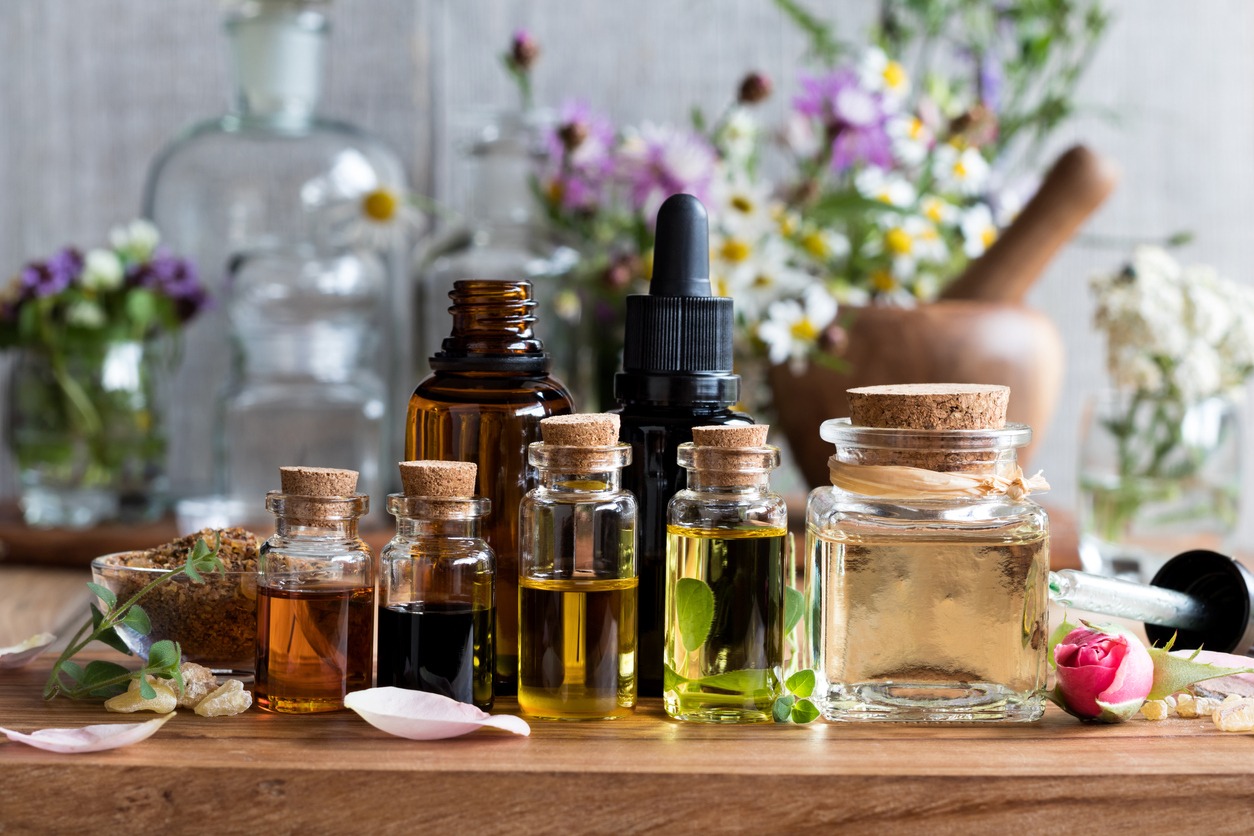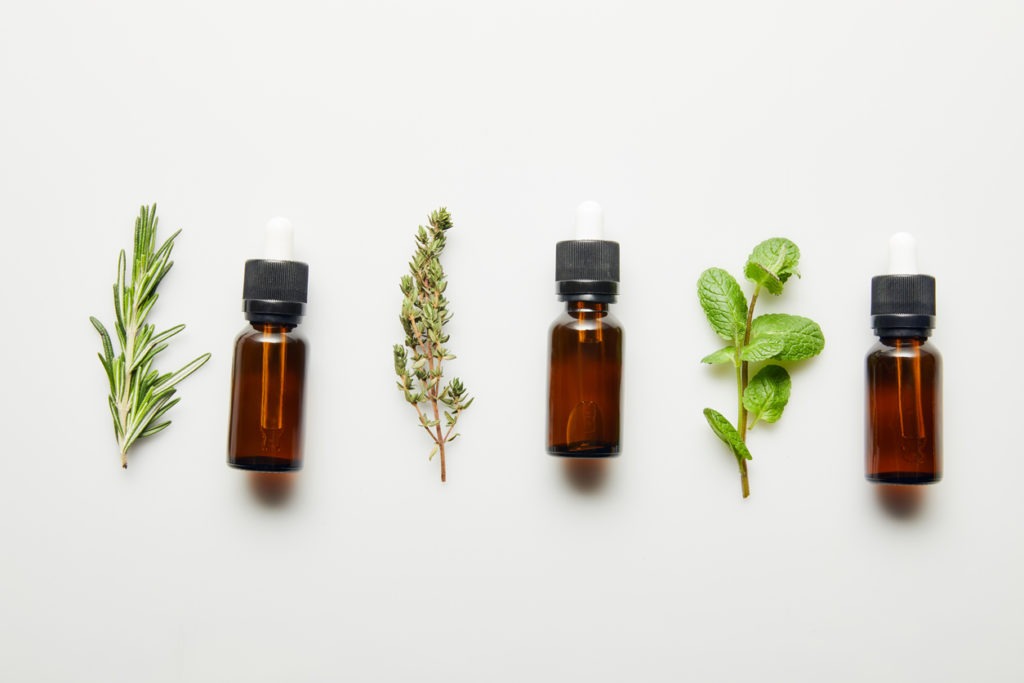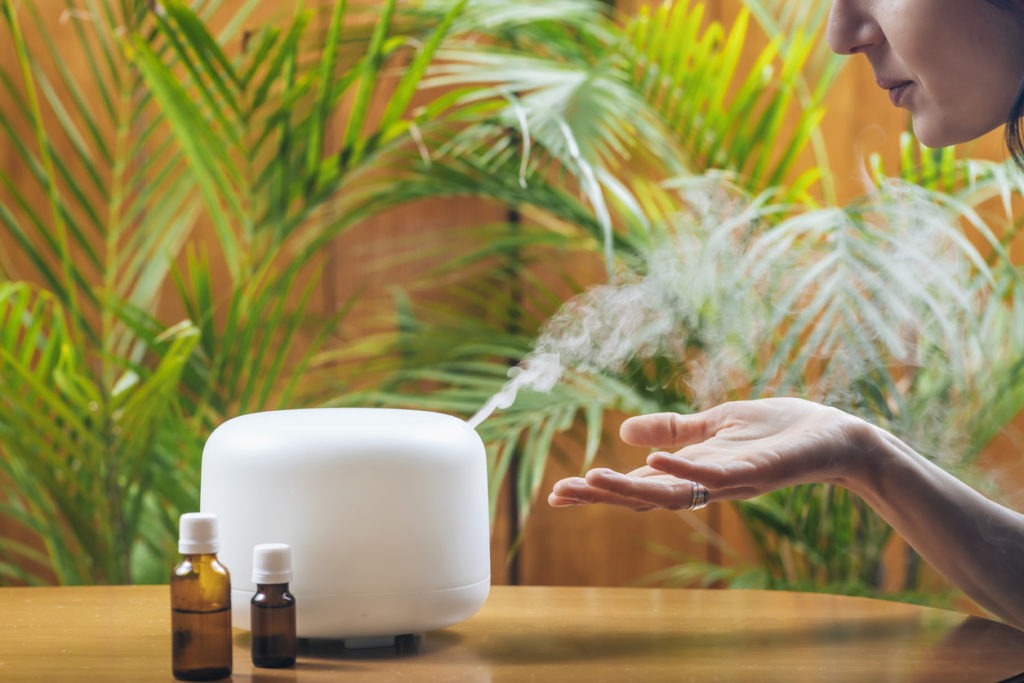Alternative medicine enthusiasts have known the power of essential oils for years. But they are becoming more popular with increasing availability and their claimed health benefits. Besides smelling great, they can help improve your mood and many aspects of your health. Essential oils are a helpful complementary approach for many health concerns. It may just be your ticket to help improve sleep, manage pain, lower stress levels, and more.
What are Essential Oils?
Essential oils are concentrated plant extracts that capture the plant’s scent, flavor, or “essence.” They are created by distillation, pressing, or steaming to trap the compounds responsible for their fragrance. Once the aromatic chemicals have been extracted, they are combined with a carrier oil to make them suitable for use. The way the oils are made is important since essential oils obtained through chemical processes are not considered true essential oils.
It takes huge amounts of plant material to make essential oils, and that’s why legitimate ones are expensive. For instance, about 250 pounds of lavender flowers are needed to make a pound of lavender essential oil. About 5,000 pounds of rose petals make a pound of rose essential oil. Because it takes so much of the plant to make them, essential oils are a powerful botanical medicine.
How do Essential Oils Work?
One helpful way they work is through our sense of smell. When you breathe in the essential oil, the scent molecules travel from the olfactory nerves to the brain. From there, the compounds interact with the limbic system, which regulates sensations, emotions, and memories.
The scent molecules can also be absorbed into the bloodstream once applied topically. Once it’s in the bloodstream, the essential oils distribute throughout the body to potentially enhance different health aspects.
Essential oils have become popular in the last several years and are heavily marketed, leading people to believe that they can cure anything. However, essential oils are not magic pills. Think of them as a helpful addition to a healthy lifestyle and an addition to your medical routine (with the guidance of your professional healthcare professional, of course).
Benefits of Essential Oils
Essential oils hold a prominent place in traditional medicine around the world. But modern medicine supports a lot of the ancient claims about them, including:
1. Lowers stress and anxiety
Many essential oils are used in aromatherapy to manage stress and anxiety. This is the reason why people gravitate to aromatherapy in the beginning. Many studies (1, 2, 3) have shown that some essential oils’ smell can work with traditional therapy to treat stress and anxiety.
Lavender is one of the most common essential oil known for its stress-relieving properties. A review and meta-analysis of studies concluded that inhaling or ingesting lavender essential oil can lower anxiety levels. They also concluded that adding lavender essential oil to massage treatments can help reduce anxiety levels. These effects may be caused by linalool and linalyl acetate, which are key compounds in lavender that have calming and sedating properties.
Besides lavender, other essential oils suited for stress and anxiety include bergamot oil, orange oil, lemongrass oil, and cedarwood oil.
2. Relieves headaches and migraines
Headaches and migraines are two of the most common pain-related health concerns. Some people turn to essential oils for relief, and there is some research on their use for headaches.
Two small studies (1, 2) conducted in the 90s found that dabbing a peppermint oil and ethanol mixture on the foreheads and temples relieved headache pain. Recent studies (1, 2) have also shown that applying peppermint and lavender oil to the skin can help reduce headache pain.
According to a review, peppermint oil can potentially relieve a headache when applied superficially around the head and temple due to its menthol content, which has an analgesic effect. It has also been suggested that applying a mixture of chamomile and sesame oil to the temples may help treat headaches and migraines.
3. Improves sleep quality
Some people who have trouble falling asleep look to aromatherapy as an aid to help them sleep. Most studies showed that smelling oils, mostly lavender oil, can positively affect sleep habits. Smelling lavender oil has also been shown to improve the sleep quality of women who just gave birth and patients with heart disease.
A study involving patients in a cardiac intensive care unit reveals that inhaling lavender essential oil can significantly improve sleep quality and anxiety. Similarly, findings from another small study revealed that taking a whiff of lavender essential oil has helped improve the sleep quality of young adults.
4. Relieve nausea
Essential oils can also be used to tame queasiness from indigestion, pregnancy, or chemotherapy. For instance, peppermint and ginger essential oil are often used for digestive discomfort and nausea. According to a study, peppermint relaxes gastrointestinal muscles and lowers inflammation that worsens nausea. On the other hand, ginger encourages the digestive process, preventing food from lingering in the gastrointestinal tract, which can also cause nausea.
Research also suggests that the physiological interactions of essential oils and the gut may offer significant benefits. A study revealed that inhaling peppermint oil can cause a decrease in instances of nausea and vomiting among hospitalized patients, with results comparable to those seen in patients who used anti-nausea medication.
5. Ease pain from menstrual cramps
Many women and girls who suffer from menstrual cramps turn to over-the-counter, non-steroidal anti-inflammatory drugs (NSAIDs) for relief. Though most women tolerate short-term use of these drugs, they aren’t recommended for women with bleeding disorders, aspirin allergy, asthma, liver damage, stomach disorders, or ulcers. It can also cause unwanted side effects.
Other holistic options, such as aromatherapy, may offer a safer alternative or complementary approach for easing menstrual pain. Essential oils are one of them. Limited research suggests that it may help relieve menstrual pain.
A study in Korea involving 45 high school girls showed that essential oils could significantly reduce pain 24 hours after an abdominal massage using the oil, compared to those who took acetaminophen. While the study looks promising, it should be taken with a grain of salt. A review that examined 19 studies on the use of aromatherapy in alleviating pain related to dysmenorrhea found moderate evidence for the efficacy of essential oils in reducing pain.
6. Offer antimicrobial and antibiotic effects
The rise of antibiotic-resistant bacteria has renewed interest in the search for compounds that can help fight bacterial infections. Many essential oils have antimicrobial and antibiotic effects when applied to specific areas of the body. For instance, eucalyptus essential oil shows potential in fighting oral bacteria, according to a review. Peppermint and tea tree essential oils are another option that is packed with antimicrobial properties.
Tea tree oil has long been touted in traditional medicine as a natural antimicrobial medicine, and this oil has been used for treating oral thrush, athlete’s foot, and fungal infections like candida.
7. Alleviates muscle pain
Mixing a few drops of essential oil into your massage oil can give benefits for different causes of muscle pain, including chronic back pain. A study in Thailand suggests that using ginger oil with a 30-minute Swedish massage can offer better long-term outcomes than massage alone when it comes to treating chronic back pain.
Essential oils can also help relieve muscle pain after a workout. A study revealed that rosemary oil could help reduce exercise-induced muscle damage and soreness.
A review and meta-analysis of 12 studies on the efficacy of essential oils for different types of pain show the significant positive effect of aromatherapy in reducing pain across all studies. However, more research is needed to fully understand the clinical applications of essential oils in terms of pain management.
8. Reduces inflammation
Some test-tube studies (1, 2) show that essential oils may help fight inflammatory conditions due to their anti-inflammatory properties.
Animal studies have shown positive results, but more human studies are still needed to prove the safety and efficacy of essential oils against inflammation. A mouse study found that ingesting a combination of oregano and thyme essential oils can help reduce the remission of colitis. Also, two rat studies on rosemary and caraway oils concluded the same.
Risks and Safety
Essential oils may offer many health benefits, but some risks may come with using them. Just because it’s natural doesn’t mean it’s always safe. Plants and herbal products contain bioactive compounds that may cause adverse health effects, and essential oils are no different.
Most essential oils are considered safe when inhaled or combined with a base oil for use on your skin at a proper dosage. But be sure to consider others who may inhale the aroma, including children, pets, and pregnant women. If you are pregnant or breastfeeding, you must consult your doctor before using essential oils.
Some of the documented side effects of essential oils include:
- Skin rashes
- Allergic reactions
- Asthma attacks
- Headaches
- Hormone imbalance
Conclusion
Essential oils are generally considered safe to use as aromatherapy or applied on the skin when combined with a base oil. It’s a great complementary therapy that can help with stress and anxiety, sleep problems, pain relief, nausea, and headaches, among other conditions.
Before using essential oils, it’s vital to do some research beforehand as some may cause allergic reactions or interfere with medications.


